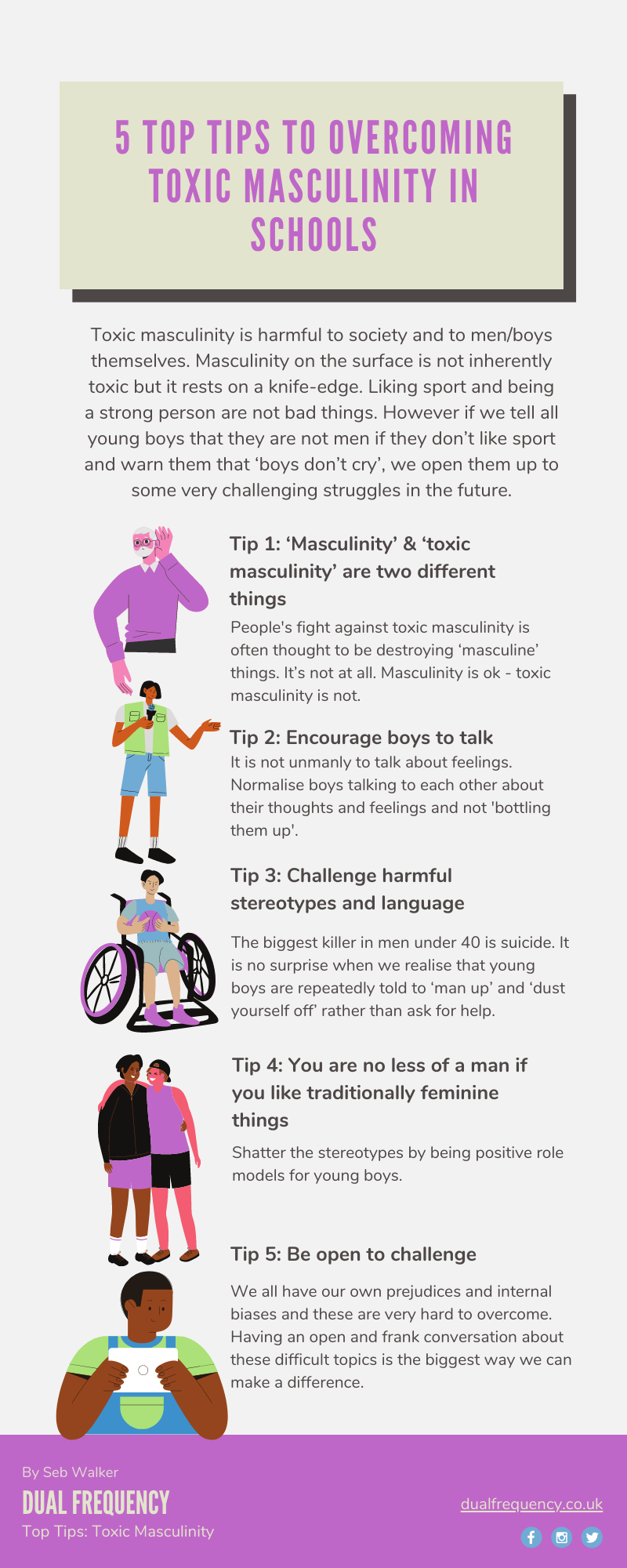5 tips to overcoming toxic masculinity in school
Written by Seb Walker for International Men’s Day
‘Toxic masculinity’ is a confusing phrase. For many men (like myself), there can almost be a pre-programmed need to instantly fight back when somebody uses the term. If you don’t know what it is or understand it, it is often perceived as an insult or attack. In truth, toxic masculinity is not helpful for anyone.
Before properly jumping into the topic of toxic masculinity I think it is important we realise that masculinity and femininity are not biological, they are the result of thousands of years of societal norms. In reality ‘masculine’ and ‘feminine’ don’t exist. For example, if someone asked you to write a stereotypical list of masculine things, you might write; strong, hard-working, likes sport, drinks beer. Then if you’re asked if only men can be or do those things, your answer would be “No, of course not”. So why are they considered masculine? Because we’ve been told our whole lives that they are. You can perform the same task with femininity.
Masculinity on the surface is not inherently toxic but it rests on a knife-edge. Liking sport and being a strong person are not bad things. However, if we tell all young boys that they are not men if they don’t like sport and warn them that ‘boys don’t cry’, we open them up to some very challenging struggles in the future.
‘Masculinity’ & ‘toxic masculinity’ are two different things. Don’t mix them up. People’s fight against toxic masculinity is often thought to be destroying ‘masculine’ things. It’s not at all. What it does is challenge the elements of traditional masculinity that have a negative impact on men and others. ‘Strength’ in masculinity is seen as everything, while ‘emotions’ are seen as a weakness. This is when it becomes toxic. Being strong is great. Being strong at the expense of your emotional wellbeing is not so great. How can we expect to move forward as a society when 50% of the population are told to suppress their feelings?
Encourage men to talk about their lives. One of the best things I can say about my two male best friends is that we are open with each other about our lives. We discuss when we are struggling. We talk when we need advice. I use the same example when talking about mental health in general, my mental health is so much stronger knowing I have that safety net. It is not ‘unmanly’ to talk about feelings.
You are no less of a man if you like traditionally feminine things. Whether you notice it first hand or not, there is huge pressure for men to be ‘Men’. We’ve seen it time and time again. Men are ‘gay’ if they like baking. A man is seen to have somehow failed if he chooses to stay at home to look after his children. He is seen as not providing for his family. Masculinity and femininity do not have to be opposites and we should teach/encourage that.
Language matters. The biggest killer in men under 40 is suicide. It is no surprise when we realise that young boys are repeatedly told to ‘man up’ and ‘dust yourself off’ rather than ask for help. It is not a coincidence the particular gender being told to suppress certain feelings, is also the one afflicted by them taking their own lives.
Be open to challenge. We all have our own prejudices and internal biases and these are very hard to overcome. Having an open and frank conversation about these difficult topics is the biggest way we can make a difference. People aren’t born with opinions, they’re taught them. People are a product of their surroundings.
About the author:
Seb works as a manager in children’s social care. Outside of work he is an ally and mental health campaigner. Find him on Linkedin and our community page.
Looking for more toxic masculinity resources?
Download our newest toxic masculinity resource, for upper KS3, 4 and 5 for use in form time & PSHE sessions
What is toxic masculinity?
A term that describes narrow repressive ideas about the male gender role, a set of negative behaviours that men and boys think they have to follow in order to be 'proper' men.
Key statistics
Just over three out of four suicides (76%) are by men and suicide is the biggest cause of death for men under 35 (Reference: ONS)
Men make up 95% of the prison population (Reference: House of Commons Library)
Men are nearly three times more likely than women to become alcohol dependent
Men are more likely to use (and die from) illegal drugs
12.5% of men in the UK are suffering from one of the common mental health disorders
Men are less likely to access psychological therapies than women

